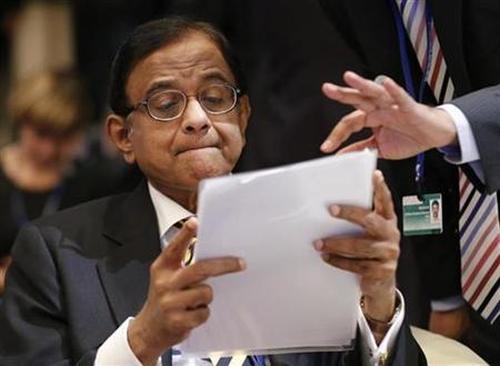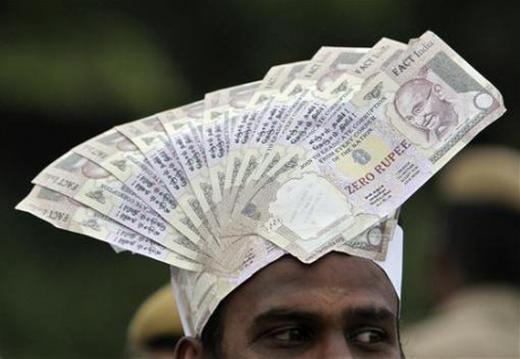Photographs: Kim Kyung Hoon/Reuters Business Standard in New Delhi
For higher tax collections, government needs to focus on tax evasion. Hiking it will result in an increase of harassment by tax sleuths and evasions.
By all accounts, the finance ministry is seriously considering increasing the marginal tax rate on the richest Indians in the next Union Budget. The reasons for this are easy to understand.
The Centre needs to act on fiscal consolidation urgently - the reminder from Fitch, the ratings agency, this week that India still stood at risk of a downgrade will not have eased minds in New Delhi.
Direct tax rates have not been revised for some time; they remain at the level set by Finance Minister P Chidambaram during his first stint in the job, in 1997.
Direct tax revenue was then at 6 per cent of gross domestic product, but is now actually lower.
Further, the Congress party will no doubt try and sell any tax increase on the richest Indians as proof of its aam-admi credentials.
However, the argument on whether higher taxes on the wealthy are justified or not should not be the main axis of decision making.
The problem continues to be that the tax administration that would be given the task of collecting this additional revenue remains unreformed, insufficiently supervised, and arbitrary. Naturally, this will breed a culture of harassment and venality.
...
Why govt should not hike the tax rate for rich
Photographs: Uttam Ghosh/Rediff.com
Meanwhile, many Indians continue to regard evasion of taxes as something akin to their patriotic duty.
These two regrettable tendencies combine to create a situation in which even the best-intentioned of attempts to deepen the tax base - such as, for example, the General Anti-Avoidance Rules (GAAR) and now any attempt to impose a surcharge on the wealthiest bracket - might well have the counterproductive effect of vastly increasing both harassment and evasion.
And it is evasion, along with the taxman's misapplied authority that both enables and encourages it, that the government must work to minimise.
After all, in 2011-12, there were 400,000 taxpayers earning over Rs 20 lakh (Rs 2 million), a mere 1.3 per cent of those assessed for tax that year. They accounted for over 60 per cent of the total revenue from the income tax.
Yet the research firm TNS surveyed India and found that about three million people had an investible surplus of over Rs 50 lakh (Rs 5 million). Or consider the number of taxpayers earning over Rs 10 lakh (Rs 1 million): that was 1.79 million.
...
Why govt should not hike the tax rate for rich
Image: NCAER says that 3.8 million families were earning over Rs 10 lakh in 2009-10. If that's broadly accurate, more than half of India's rich are evading taxes.Photographs: Babu Babu/Reuters
However, household surveys by the National Council for Applied Economic Research say that 3.8 million families were earning over Rs 10 lakh in 2009-10. If that's broadly accurate, more than half of India's rich are evading taxes.
Deepening the tax take from India's richest may be good politics; but it is neither as pressing nor as useful as broadening the tax net.
The finance ministry must ensure that direct taxes earn more from the Centre than they have of late. But it is clear that the primary problem is evasion. Is this easy to fix? No. But it need not be encouraged either.
In any case, ambitious plans for increased taxation and more complex tax structures will only be credible or effective if they are accompanied by clear and rational approaches to reforming India's tax administration.
It remains to be seen whether the finance ministry is as enthusiastic about what it must do as it is about what it can do.





article